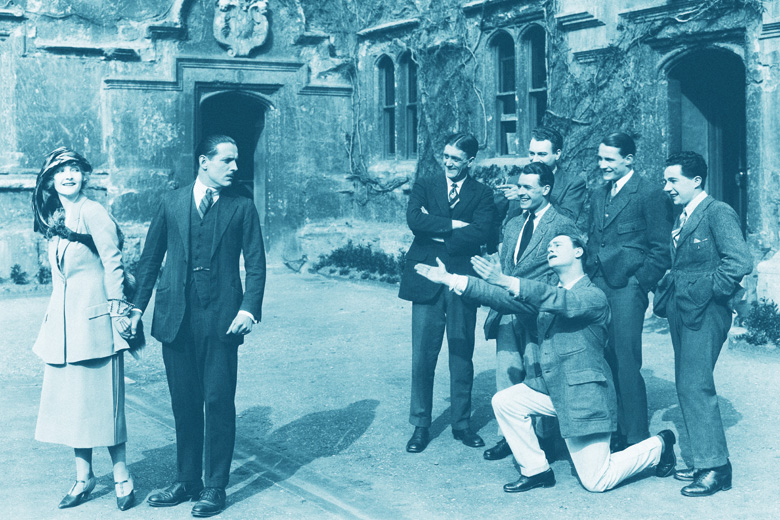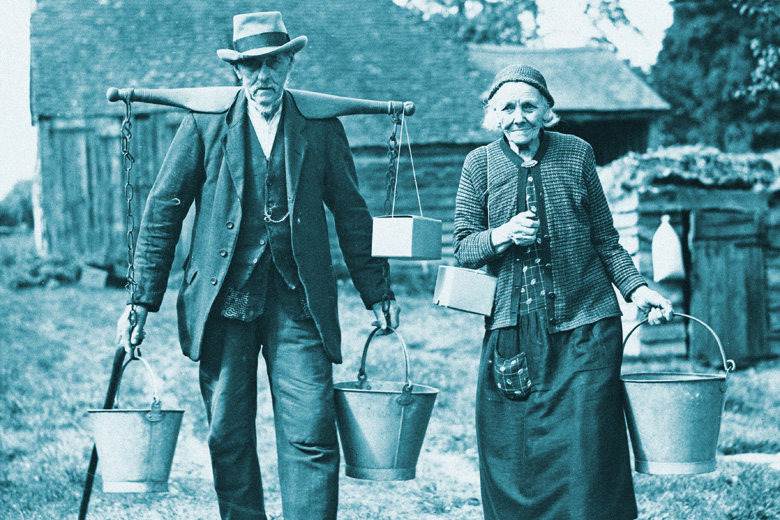‘Academia has become an ever-present third party in our relationship, for better and for worse’
My partner and I met 11 years ago while she was working in the public health sector and I was studying for my doctoral degree. Over the years, she has witnessed the highs and lows of my move into academic life – the late, lonely nights with only my laptop for company, the lengthy, soul-destroying search for employment and the relief of (finally) securing a permanent academic post. Academia has become an ever-present third party in our relationship, for better and for worse.
In many ways, having a partner who does not cohabit my academic world makes little difference to me. Our daily lives are shaped by myriad decisions and experiences that remain untouched by our disparate careers – what to have for dinner; how to celebrate our birthdays; whose turn it is to feed the cat. In other ways, though, my partner’s detachment from academic life is deeply significant to me.
I have always been awed by her commitment to working in massively stressful healthcare settings. And, while I regularly fret about the clarity of words on a page, or an imminent grant-writing deadline, I am ever aware that she confronts on a daily basis the realities of pain, sickness and the fragility of human life. For this reason, she is my cherished touchstone, reminding me that there are more things in heaven and on earth than the narrow priorities of the ivory tower. “At the end of the day, Blythie, is it a matter of life or death?” has become our mantra.
At the same time, however, we are conscious of the bittersweet effects that my academic career has on our relationship. Heavy teaching and supervision commitments, administrative demands and the unrealistic pressures on all academics to “publish or perish” mean that I typically work more than 70 hours a week. From Monday to Friday, our “quality” time together is limited to a few hours in the evening, while my weekends and annual leave allowance are typically nibbled away by lecture preparation, grading student papers and catching up with my research. This is the reality faced by most academics I encounter, both nationally and internationally. And, while my colleagues and I remain deeply committed to our university employers, our students and our research, we are likewise conscious that these commitments often come at a huge cost to our families, our relationships and our health.
Only a global paradigm shift in academia can even begin to remedy this; yet surely searching for such a remedy has to become an imperative for both higher education institutions around the world and the governments who fund them. Otherwise, to paraphrase W. B. Yeats, things will fall apart, and the centre of higher education – academics and all those who support them – will not hold.
As I sat down today to write this article, I asked my partner to describe in one word what it was like to live with an academic. “Lonely,” she replied.
Caroline Blyth is lecturer in religious studies at the University of Auckland.

‘I have enjoyed experiences that my teenage self could never have envisaged, including several summers spent in the Arctic’
Asking someone what it is like being the partner of an academic is rather like asking what it is like living with a dog. In the case of the latter, it depends on the breed of dog and its individual personality, probably in equal measure. So it is with academics. I can imagine that living with a philosopher would be rather different from living with a scientist whose research depends largely on laboratory- or fieldwork and its practicalities. Throw personality into the mix and you have as many different experiences as there are academics. Over the years, I have met a multitude of academics, whose personalities range from the fearsomely arrogant to those with a gentle humility.
From the outset of our relationship, it was clear that my partner was totally driven by his desire to seek answers to the biological questions he posed. I knew then that I would need to accommodate this drive throughout our life together. This has indeed been the case over 40 years, and, for the most part, it has not been difficult, particularly since – without being a university academic – I have similar interests. I have enjoyed experiences that my teenage self could never have envisaged, including several summers spent in the Arctic enjoying close encounters with musk ox, narwhals, seabirds and – a little more distant – polar bears.
In contrast, I have also spent many months alone as my partner pursued his research interests across the globe. Probably the most difficult time was in the 1980s when we had three children under five, and he spent two months on the other side of the world. I had a demanding, full-time job and found it incredibly difficult to juggle this with home life, even with the help of a super childminder. During those weeks of forced estrangement I relied on a circle of close friends.
On a day-to-day basis, our lives have evolved to match the different demands of different phases. Our children, like myself, have recognised their academic father’s need for plenty of quiet thinking and working time. This has sometimes added a little extra pressure on family life, particularly when the children were young. And it was not unknown for us all to be banned from the house during a television filming episode or live radio broadcast.
As in many other professional walks of life, we have had to prioritise certain fixtures in the academic year, but this is more than compensated for by the opportunities it provides, such as meeting interesting people and being included at formal dinners. Early on in our partnership, I felt obliged to have an open house for visiting lecturers, but have since learned how to be a little more selective about whom we have to stay.
I do, in fact, live with both a dog and an academic. In both cases, it is fair to say that their merits outweigh the drawbacks – although if I were asked to make a choice...
The author is the partner of a biologist.

‘I really enjoy the intellectual stimulation that comes with living with an academic’
My husband, Kieran Binnie, and I met while he was at law school and I was a PhD student. A decade, multiple city moves, several jobs, three years of marriage and a baby later, we now live in Birmingham. He practises law and is also a freelance woodwork writer. I’m a Leverhulme early career fellow in history at the University of Oxford. During our relationship, I have been a student, an office worker, unemployed, on multiple fixed-term teaching contracts and am now on my second research fellowship.
Kieran has a master’s degree in early modern history and this gives him a great understanding of why I find my work fulfilling, and it has made him a sympathetic and supportive partner in my multiple rounds on the job market. He even considered staying on for further study before deciding that law was likely to be a more reliable choice of career. As I’ve been employed by four different universities since I graduated in 2010, sometimes I think he made the more pragmatic choice! But when I asked him, for this article, whether his close observation of my own trials and tribulations makes him think that he had a lucky escape, he denies it.
“I still miss history, but academia is so all-consuming that had I persevered in that direction I wouldn’t have been able to take the opportunities that have allowed me to develop a satisfying second career in writing,” he says.
That said, he sees many advantages in living with an academic: “Having a subject that we both love means that we are never short on interesting conversation,” he says. “I really enjoy the intellectual stimulation that comes with living with an academic and I think that, as an academic, you’re probably a lot more sympathetic than other spouses would be when I’ve had writing research trips to peculiar locations.”
But he admits that my lack of job certainty and the scarcity of permanent positions in the academy are problems that have weighed on us heavily at times. “We’ve been lucky in that we’ve been able to respond flexibly to an uncertain job market by being creative about geographic location and working a distance away from the family home. But I do wonder how that will work now that we have a child and a mortgage,” he says.
He also laments the impact on our lives of UK academia’s “relentless focus on research excellence framework scores and impact”. This “actively undermines academics and can encourage an unhealthy work-life balance, particularly for early career academics, who don’t have the benefit of permanent positions”, he says. “You have always been very good at working hard while maintaining a healthy approach to family life, but I think that maintaining such a balance is, in itself, hard work.”
Rachel Moss is lecturer in late medieval history at Corpus Christi College, University of Oxford.

‘Academia often feels as if it caters to men in a very conservative, married heterosexual set-up’
When I was finishing my PhD, I lived in a shared flat with a secondary school teacher. She did not understand the rhythms I felt it necessary to live by in order to complete a 250-page thesis alongside a full-time teaching load and a not insubstantial side order of administration. I often spent Friday nights working until 4am and slept in until well after midday at the weekend – at which point I’d head to the office again, not returning until late. I could almost feel the waves of disapproval emanating from my flatmate over my non-existent work-life balance.
I admit that I was a terrible housemate during that period. Clothes got left, distractedly, in wet heaps on the bathroom floor. I rarely had time to vacuum the apartment and I often drank the last of her milk after a late night at the computer screen, and forgot to replace it.
At our core, many academics are obsessives. Many of us are driven by a perverse need to follow a thought to its most obscure conclusion; to dig away at an idea for years on end, often at the expense of our health, well-being and relationships. Almost all of us are unable to wholly let go of our work (I have colleagues who admit to holidaying with PhD theses as beach reading). This tendency towards workaholism is why (save the year or so when I took a flatmate) I have mostly lived alone since becoming an academic. I like my own space. I like not having to stop reading halfway through a fascinating chapter to discuss what we’ll have for dinner.
However, living alone is a defence mechanism too. Moving in with a partner is a huge commitment: one that sets you on a path towards marriage and eventually, perhaps, children. At the back of my mind I know that, as a heterosexual female academic, finding a long-term partner and having children will mean a huge sacrifice in terms of my career. Finding someone who is willing to make space for my academic habits has been difficult and it is harder to think about how I could make a relationship work than it is to ignore that part of my life entirely.
This career often feels as if it caters to men in a very conservative, married heterosexual set-up. There is very little understanding in universities, at a structural level, that many women working in academia will have caring responsibilities that make absolute dedication to their work difficult. I’ve seen female colleagues with children struggle to achieve promotion at an equal rate. They have their commitment questioned if their productivity drops after having children, or when they leave after-hours functions early to pick up children, or when they decline to spend extended periods away from home to further the university’s internationalisation strategy.
I am content to indulge my intellectual obsessions for the time being. But it would be a relief to see universities make changes that enabled me to believe that a healthy relationship, a live-in lover and a family, with all the effort that entails, would not mean the rapid deceleration of my career.
Katie Beswick is a lecturer in drama at the University of Exeter.

‘Time together can feel like time apart, when your focus on work is so intense you struggle to wind down’
I get to share my home life with both my partner and my mother – and both of them, it turns out, find living with me less than plain sailing.
I spend most of my time in the eco-house I built with Mum, a library assistant. But at weekends and holidays, Tim, an IT integration architect, joins us – or else I stay at his house. It is an unusual arrangement but it has worked well for 11 years. Or so I thought. Asking them what it is like living with me raised cautious eyebrows and Mum queried: “How honest do you want us to be?”
It seems that the worst part is “that time together can sometimes feel like time apart, when your focus on work is so intense and you struggle to wind down”, as Tim puts it. “Once your brain is working, you don’t have time for anyone or anything else,” Mum adds. This, apparently, makes me snappy and impatient – to which Mum’s favourite retort is: “Don’t you try and be all professorial with me!” Egos get short shrift in our house.
Not surprisingly, neither of them enjoys seeing me stressed out when, as Mum puts it, “work demands intrude into the house”. They are uncomfortable when I get irritated by an unreasonable email or an unwanted media request. But, more than that, Tim dislikes seeing the negative effects on me of almost continuous grant rejections and is frustrated that he is not able to help. I fear that both of them live with my job far more than they want to or should have to. So it is quite understandable that Mum quite enjoys it when I go away for fieldwork and conferences.
For Tim, though, these trips, which sometimes last as long as four months, are his least favourite aspect of living with me. Sometimes he tags along, and he admits that doing so has allowed him to visit places and meet people that he would never otherwise encounter. However, he has declined to repeat camping in the Australian outback in 40°C heat without facilities. Apparently, he has had enough spiders, snakes, frogs, crabs and scorpions for a while.
One thing he misses when I am away, he tells me, is the intellectual conversations with an equal, on topics that he wouldn’t normally engage with. He has two degrees in physics, so his natural science worldview often clashes with my social science perspective. I also love these conversations: they challenge me and remind me how little I know. Tim also saves me from embarrassing myself with poor statistics or badly conceived graphs.
Mum would like me to take fewer risks and travel to “safer” places, but she concedes that, despite the worry, living with me makes “life more interesting”. She also likes the way that I analyse the world and add a broader perspective to current affairs – although she could live without the constant feminist critique of television.
Before he met me, Tim apparently used to wonder whether he should have become an academic. Now he constantly says that he is very glad that he didn’t, but he continues to share my academic successes – even while encouraging me to work less. As for me, having heard how detached I can be, I am trying to be more present in both his life and Mum’s.
Jenny Pickerill is professor in environmental geography at the University of Sheffield.

‘When we were both academics applying for the same pot of money at the same time it was emotionally complicated’
It is very hard to separate John the academic from John the person – and not just because he has never had another full-time job. He would still be an emotionally engaged, enthusiastic and eccentric barman, soldier or night cleaner at a refrigerated yogurt warehouse. Most of the time he loves his job and it suits his temperament – the flexibility, the variety, the discovery of niche facts. But the pluses and minuses of academia are intrinsically linked: it is a lifestyle, a hobby, an obsession that cannot be turned off or left in the office. That impacts our life together – and not merely in the form of dinnertime monologues about arcane facts and the odd burst of whingeing about how unfair the system is.
I understand very well where John is coming from because I too was a researcher, in both university and big pharma, before I quit the bench to work at a biomedical charity. I understand how difficult it is to get funding, and that most applications are unsuccessful, regardless of the amount of work and emotional investment that goes into them. Therefore, I understand the despair that follows a rejection. That doesn’t mean that John’s rejections aren’t difficult to live with, but, over time, I am learning the signs and how best to manage these situations. In the immediate 24 hours after rejection (the mourning period), I leave him to his Xbox. Then I make gently supportive noises until, finally, he has moved on.
It also helps that I am no longer a researcher myself. When we were both academics applying for the same pot of money at the same time it was emotionally complicated: it’s hard to feel truly happy for someone when they have won and you have not. Having a different career also means that, hopefully, we won’t both lose our jobs at the same time. This gives us creative freedom to think about our jobs, not just about bringing in a wage packet.
In general (as well as in this particular case), I find academics amazingly talented. The single-minded focus, the creativity, the blue-sky thinking, the resilience and perseverance needed to pursue the career are all to be admired. But in no way am I jealous of them. To be honest, when I was asked by John if I wanted to be an academic, my response was: “No, thank you!”
Charlotte is the partner of John Tregoning, senior lecturer in the mucosal infection and immunity section of virology at Imperial College London.

‘We moved this summer and I packed, loaded and unloaded more than 40 boxes of books I swore I couldn’t part with, yet knew I’d never read’
Desiderius Erasmus got it wrong: it is not women but academics who we can’t live with and can’t live without. Had that early modern academic and Catholic priest been married – and, heaven knows, many of his peers were, despite the official prohibition – his wife would no doubt have agreed. My own wife, Julie, a brilliant physiotherapist, would also agree with that statement as applied to this particular postmodern academic.
Or so I hope. But I also worry that she would find that there are many more things she can live without than with.
What falls into the “without” category? After nearly 14 years of marriage, I have a pretty good idea: almost everything I acquired as a grad student. There are the material things, of course, such as books. (We just moved this summer and I packed, loaded and unloaded more than 40 boxes of volumes I swore I couldn’t part with, yet knew I’d never read.) Then there’s clothing. (Although 30 years have passed since I defended my dissertation, I still look like I stepped out of a discount outlet.) And music. (While our kids have introduced me to Lindsey Stirling and Fall Out Boy, I still fall for Bruce Springsteen and U2.)
More problematic are the immaterial things I can’t throw over. Habits, for example. When she leaves the nursing home, Julie does what most human beings do: she leaves her work behind (although this has begun to change since she became director of the rehab department). But, to my mind, the idea of leaving work behind is like juggling skittles while riding a unicycle. While it’s an accomplishment, why would one ever want to do it in the first place? My work, as my wife and children know too well, follows wherever I happen to be – including couch, bathroom or, most frequently, kitchen table.
It’s also there, in the kitchen, that I measure the distance between academic life and real life. Julie recounts stories from work: older patients struggling with their ageing and battered bodies, or their ageing and scattered minds. I listen to her accounts of family members cheering the few steps taken by a loved one, fearing their health insurance will run out before any more can be taken. I wonder at her endless effort to balance the demands of her employer and the demands of her patients, treading the line between maintaining her productivity numbers and retaining her ethical standards. And I close my eyes when she tells me she arrived at work that morning to find the empty bed of a patient she had washed the night before.
Don’t get me wrong: I would have quit the groves of academe years ago if I believed there were not troves of good and great things growing there. But life with a non-academic reminds me that these groves tend to become hothouses – places of astounding but often artificial concerns – without the constant trimming of reality.
Robert Zaretsky is professor of history at the University of Houston and the author, most recently, of Boswell’s Enlightenment (2015).
Register to continue
Why register?
- Registration is free and only takes a moment
- Once registered, you can read 3 articles a month
- Sign up for our newsletter
Subscribe
Or subscribe for unlimited access to:
- Unlimited access to news, views, insights & reviews
- Digital editions
- Digital access to THE’s university and college rankings analysis
Already registered or a current subscriber?




